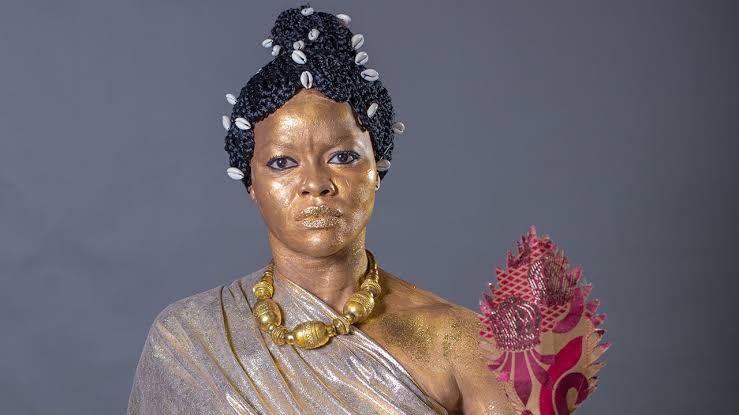In this article, we shall revisit how African heroines contributed to the survival and prosperity of their tribes. Previously, we’ve looked into the history and stories of great African Nigerian Heroines cutting across the three main tribes – “ Aba women (Igbo) and Queen Amina of Zaria (Hausa) and for the third and final episode on African Heroines, we shall dive into the story of one of Yoruba great heroine’s “QUEEN MOREMI AJASORO”.
In this article, we will learn of the remarkable story of Queen Moremi Ajasoro—Africa’s lady liberty—from the medieval Kingdom of Ile‐Ife (also called Ife) in modern‐day Nigeria.
The beautiful story of Queen Moremi Ajasoro of Ile-Ife is a familiar story and history to every Yoruba indigene as well as people from other parts of Nigeria.
The history of the brave queen is seen as a legacy and today it’s taught in schools, retold in books as stories, sang as songs, recited as poems and acted in movies, performed on stages and viewed in cinemas as a way of preserving the memory of her bravery and the sacrifices she made in order to save the city of Ile-Ife.
Not much can be said about her childhood or early days because of the gap in history between Moremi’s youth and when she moved to Ile‐Ife where she married the Ooni.
We know nothing about her childhood experiences or what really influenced her thought process while growing up or what might have triggered her zeal and passion as a freedom fighter.
Whatever the story might have been, what we do know was that her story began in the 12th century while she was a queen in Ife, when the kingdom was under the invasion of the Igbo raiders who occasionally looted the market in Ife and abducted citizens of the kingdom into slavery.
We also do not know for certain what exact year Moremi was born or when she died due to the lack of written evidence.
But we do know that she was a princess from the town of Offa and was later married to the Ooni (king) of Ile‐Ife. Her husband was either Ooni Obalufon Alayemoye II or Ooni Oranmiyan—both direct descendants of Ooni Oduduwa, the legendary founder of the Yoruba tribe and the first Ooni of Ile‐Ife.
Moreover, what will you say about a mother who sacrificed herself to be a slave and offered her only son as an offering to a goddess of the river in return for victory and liberation of her people?.
Or what will you say about the goddess that accepted the sacrifice of human begin as payment for bargain?. I think it will be too early to justify any of their actions. Let’s dive down into history and see how it all went.
MOREMI AND THE UGBO INVASION IN THE 12TH CENTURY
It all began back in the 12th century, with the invasion of a neighbouring town, The Ugbo people. These people are known to be raiders who often stole properties, staple foods, and domestic animals.
They are believed to be from a neighbouring community called “Ugbo”. Although the people of Ile‐Ife were furious about these raids, they did not have the means to defend themselves.
This is because the Ugbo invaders are seen as spirits by the people of Ife. Yoruba masquerades are always dressed in cotton robes but the Ugbo raiders—who appeared as masquerades—were completely covered in raffia leaves.
Though the said tribe is believed by scholars to have had no relation to the contemporary Ìgbòs of modern-day Nigeria.
After several raids and tired of the regular raiding parties that the Ugbo were sending into Ile-Ife to capture slaves, Moremi thought of a strategy which involves what I call “ the trick of the gods”.
In order to find a solution to defeat the raiders So she sought help from an oracle that instructed her to visit the goddess of Esimirin River. In early Yorubaland, the people of Yoruba see the Orishas as the conductor of the forces of nature and individuals would barely take a decisive course of action in their lives without consulting an orisha either personally or through a Babalawo (Ifa priest).
Moremi ventured into a sacred stream to appease and consult with the local river spirit, the Esimirin river. The goddess promised to help Moremi but at the expense of payment with her most precious possession.
Moremi agreed not knowing what will be the price and went home and acted as she was instructed by the river spirit to work on a classic spy plan.
The plan was that She would pose as a trader on the next market day and allow herself to be captured by the raiders.
Once in captivity, she planned to infiltrate the Ugbo leadership with her beauty and magic in the hope of finding a weakness that the people of Ife could exploit. Moremi had to walk into the lions’ den.
The next time the Ugbo raiders came, Moremi did as she was told, she let herself to be captured as a slave.
After she was captured, she incorporated herself into Ugbo society, eventually becoming chosen for her beauty as one the wives of the ruler of the Ugbo(Forest) kingdom.
With time, she familiarizes herself with the people and the Ugbo army just as camouflage to know the secret behind the strength of the Ugbo army. She learnt their secret- The Igbo warriors would wear battle costumes made from raffia palm and other highly-flammable grass when going raiding.
Moremi kept this revelation to herself and soon made her way back to Ile‐Ife by escaping the community of Ugbo people.
Back in Ile‐Ife, Moremi tipped the Ooni about her discovery and advised that on the next market raid, some people should be on standby with Igita (short hard tree branch) and Oguso (a ball of the middle layer of a palm kennel font).
She explained that the Oguso should be lit when the marauders were in the market and that the burning Igita be used to torch the masquerades. They did as Moremi had instructed them.
The Ugbo raiders were burned and defeated by Moremi heroic plan and that was how she became the Messiah of Ile-Ife. But that was not the end of the story.
The battle is won and victory has been claimed, but payment must be made to the goddess that guided Moremi into victory because a promise must be kept.
Unfortunately, sorrow knocked on Moremi’s door as the river goddess demanded she sacrificed her only son, Oluorogbo to keep her own end of the bargain.
Moremi pleaded with the goddess for a less terrible offering. But in the end, she had to her promise, paying the price with the life of her only son.
CONCLUSION
The story of Queen Moremi Ajasoro has taught us so many lessons that go beyond bravery and heroism. One of the vital lesson is about the Exodus of African gods.
Today, we so much disregard and forsake our own gods as a result of western civilization. The story of Moremi proves how spiritualism and African voodooism (Witchcraft) are keys to the liberation of the Yoruba people.
Most importantly, Moremi’s heroism also put to rest the notion that women were inherently silent in African history.
Women played critical roles in the construction, development and richness of the history of ancient and medieval Africa.


